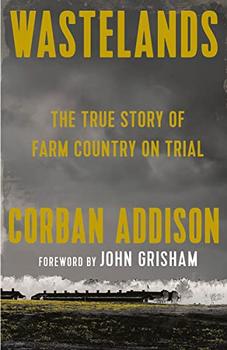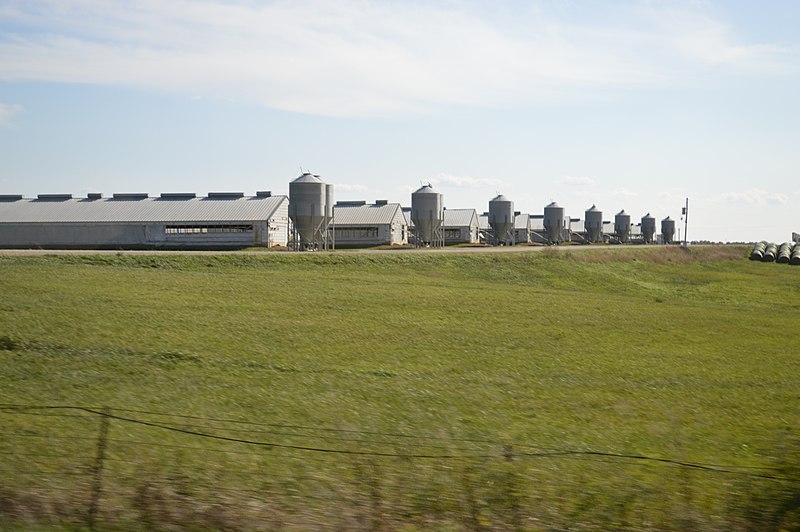Summary | Excerpt | Reviews | Beyond the Book | Read-Alikes | Genres & Themes | Author Bio

The True Story of Farm Country on Trial
by Corban AddisonThis article relates to Wastelands
 In Wastelands, Corban Addison recounts the true story of a group of North Carolina residents fighting for justice after suffering through years of pollution and nuisance from neighboring industrial hog farms. It's an uphill battle against a powerful multinational corporation, a broken regulatory system and a political establishment determined to shield the state's billion-dollar hog farming industry from accountability.
In Wastelands, Corban Addison recounts the true story of a group of North Carolina residents fighting for justice after suffering through years of pollution and nuisance from neighboring industrial hog farms. It's an uphill battle against a powerful multinational corporation, a broken regulatory system and a political establishment determined to shield the state's billion-dollar hog farming industry from accountability.
North Carolina's pork lobby was not always so powerful, and pig farms were not always so polluting. Traditionally, hog farming was a small-scale affair, with a large number of independent family farmers raising a small number of pigs alongside other animals and crops.
But while in 1965 North Carolina had an estimated 74,000 such hog farms with an average of 16 pigs per farm, by 2016 the state had only just over 2,000 farms, averaging thousands of hogs each. The majority of these farms are massive industrial facilities referred to as concentrated animal feeding operations, or CAFOs—better known as factory farms.
Discussions of factory farming typically focus on animal welfare issues—with good reason. Confined in abysmal conditions for the entirety of their lives, pigs in CAFOs are crowded in unsanitary indoor pens of hard metal and concrete, sometimes thousands to a single barn. Unable to freely roam or graze on open land, they are mechanically fed and watered, pumped full of antibiotics to combat the diseases that spread in their cramped quarters and shipped off to slaughter at six months old, never having seen the light of day.
But CAFOs are more than just an animal rights issue. The massive scale of these operations and the industrial methods used to run them are responsible for unsustainable levels of waste and pollution that degrade neighboring communities, harm the environment and pose a public health risk.
Untreated wastewater from CAFOs—a toxic brew of animal feces, urine and blood, antibiotic residues, growth hormones, heavy metals and harmful bacteria—seeps into water sources, contaminating drinking water, and overflows into rivers and streams when it floods. Ammonia, hydrogen sulfide, particulate matter, volatile organic compounds and other hazardous pollutants poison the air.
Almost half of the workers who labor inside CAFOs suffer from respiratory illnesses because of their exposure to concentrated levels of contaminants and fumes. And North Carolina residents who live near factory farms are at elevated risk for a whole host of health problems, including asthma, lung disease, anemia, headaches, nausea, kidney disease, high blood pressure, infections, lower life expectancy rates and higher infant mortality rates.
When the community members in Wastelands sued Smithfield Foods, one of the biggest names in North Carolina's hog industry, they restricted their case to a nuisance claim for strategic reasons, focusing narrowly on how hog farm pollution infringed on their right to enjoy their own property unimpeded, rather than on broader claims about the effects on their health, the environment or animal welfare.
But as Addison writes, "Everything is connected—the air, the soil, the water, the health of animals, and the well-being of human beings." The stench and contamination that make living near hog farms unbearable, the ravages to the surrounding environment, and the terrible suffering inflicted on the hogs—"cooped up by the thousand in cages of misery and debasement," as Addison puts it—are all connected links in a vast system of intersecting harms embedded in our industrial model of food production. The disregard for the lives of the people forced to live near factory farms is the flip side of a failure to consider the impact of these farms on animal lives and the larger environment.
Reflecting on the nexus of harms involved in industrial hog farming, one of the judges quoted in Wastelands wonders how the conditions the plaintiffs were forced to put up with for so long could have been allowed to persist. "What was missing," he remarks, "was the recognition that treating animals better will benefit humans. What was neglected is that animal welfare and human welfare, far from advancing at cross-purposes, are actually integrally connected."
Concentrated animal feeding operation (CAFO) owned by Smithfield Foods in Missouri, 2013. Courtesy of Socially Responsible Agricultural Project (CC BY 4.0)
Filed under Society and Politics
![]() This "beyond the book article" relates to Wastelands. It originally ran in July 2022 and has been updated for the
September 2023 paperback edition.
Go to magazine.
This "beyond the book article" relates to Wastelands. It originally ran in July 2022 and has been updated for the
September 2023 paperback edition.
Go to magazine.
Your guide toexceptional books
BookBrowse seeks out and recommends the best in contemporary fiction and nonfiction—books that not only engage and entertain but also deepen our understanding of ourselves and the world around us.